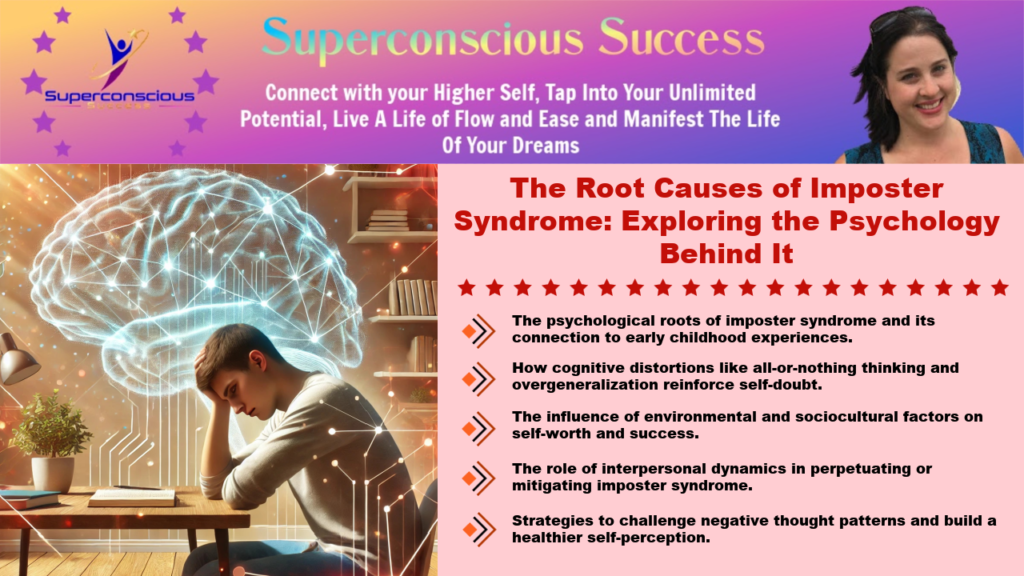
Imposter syndrome, self-doubt, and self-worth are intricately connected, often impacting our professional and personal lives in profound ways. In this blog post, you’ll learn about the psychological underpinnings of imposter syndrome, how cognitive distortions reinforce these feelings, and the role of environmental and sociocultural factors. Additionally, we’ll explore the significant influence of interpersonal dynamics on self-doubt and self-worth. By understanding these elements, you can begin to address the root causes of imposter syndrome and cultivate a healthier self-perception.
Page 1
Page 2
Additional Information
Psychological Underpinnings of Imposter Syndrome
Imposter syndrome often stems from early childhood experiences and personality traits, shaping our self-perception. These factors lead to persistent feelings of self-doubt and low self-worth well into adulthood.
Parental expectations and the type of praise and criticism we received during childhood are crucial. Growing up in an environment where people emphasized excellence may have led us to internalize a need for perfection. When we received praise only for achieving high standards, we might have started to equate our self-worth with our accomplishments. Conversely, excessive criticism could instill a persistent fear of failure. Both scenarios contribute to fragile self-worth and make us constantly fear being exposed as frauds.
The feedback received during formative years is also vital. Constructive criticism can help build resilience and a healthy attitude towards failure. However, harsh or inconsistent feedback might lead us to believe our efforts are never quite good enough, planting the seeds of imposter syndrome. This internalized self-doubt can be a significant barrier to recognizing and celebrating our achievements.
Personality traits like neuroticism, perfectionism, and low self-worth further heighten the risk of developing imposter syndrome. High neuroticism may lead to increased anxiety and self-doubt. Perfectionists often set unrealistically high standards and attribute successes to luck rather than skill. With low self-worth, a persistent sense of inadequacy makes us more vulnerable to feeling like imposters.
Understanding these psychological underpinnings gives us insight into why imposter syndrome manifests and persists. By recognizing the influence of early childhood experiences and personality traits, we can start addressing the root causes of self-doubt and work towards a healthier self-perception.
The Role of Cognitive Distortions
Cognitive distortions significantly contribute to imposter syndrome. These irrational, biased ways of thinking skew our perception of reality, reinforcing feelings of inadequacy and fraudulence. One common distortion is all-or-nothing thinking, where we view situations in black-and-white terms without recognizing any middle ground. We might feel that we must be perfect in our tasks and that any mistake, no matter how minor, confirms our incompetence. This perfectionist mindset can lead to chronic self-doubt and anxiety.
Another frequent cognitive distortion is overgeneralization, where we take a single negative event and generalize it to all aspects of our lives. For instance, receiving one piece of critical feedback might make us think we’re incapable in all our professional endeavors. Overgeneralization magnifies negative experiences, making them seem more significant than they are, further entrenching our belief in being frauds.
Discounting positive feedback is a common distortion in imposter syndrome. We often dismiss our achievements or praise, attributing them to external factors like luck or timing rather than our own abilities. This behavior creates a vicious cycle where we undervalue positive experiences and amplify negative ones, distorting our self-perception.
These cognitive distortions act as filters that selectively focus on information confirming our belief of inadequacy while ignoring or downplaying evidence to the contrary. This selective attention reinforces the cycle of imposter syndrome, trapping us in a pattern of distorted thinking that perpetuates feelings of being imposters.
Understanding the role of cognitive distortions is crucial for addressing imposter syndrome. By identifying and challenging these irrational thought patterns, we can start reconstructing a more balanced and accurate self-perception, gradually diminishing the grip of imposter syndrome.
Continue Reading (Page 2)
Environmental Influences and Sociocultural Factors
Imposter syndrome is influenced by environmental and sociocultural factors. Cultural expectations and societal standards of success shape how we perceive our achievements and competencies. Society often defines success narrowly, emphasizing external validation, material wealth, and professional accolades. These definitions create immense pressure to achieve, leading us to internalize unrealistic standards.
Social comparison is another critical factor that heightens imposter syndrome. In today’s era dominated by social media, we’re constantly exposed to curated portrayals of success, which can foster a sense of inadequacy. The fear of failure is exacerbated by the pervasive narrative that equates failure with personal deficiency rather than a natural part of the learning process. These societal narratives contribute to a culture where we feel compelled to mask our insecurities and downplay our accomplishments.
Family dynamics and upbringing significantly affect the development of imposter syndrome. Parents and guardians, often with good intentions, may set high expectations, emphasizing the importance of achievement and excellence. While such encouragement can be motivating, it can also lead to a fear of disappointing loved ones, nurturing feelings of inadequacy when these expectations aren’t met. Peers and educational systems further reinforce these pressures by establishing competitive environments where success is measured against the performance of others.
Educational institutions play a crucial role in shaping perceptions of competence. Grading systems, class rankings, and standardized testing can perpetuate a fixed mindset, suggesting that intelligence and ability are static traits. This can discourage risk-taking and experimentation, reinforcing the notion that failure reflects one’s inherent worth. Consequently, we may feel like imposters, attributing our successes to luck or external factors rather than our abilities and efforts.
Understanding the environmental and sociocultural factors contributing to imposter syndrome is essential for developing strategies to mitigate its impact. By addressing these external pressures, we can cultivate a healthier relationship with success and self-worth.
Interpersonal Dynamics and Imposter Syndrome
Interpersonal relationships play a pivotal role in the development and perpetuation of imposter syndrome. The complex interplay between us and our social environment can significantly influence feelings of inadequacy. Relationships with friends, colleagues, and mentors can either mitigate or exacerbate these feelings, depending on the nature of the interactions and the quality of support provided. Positive interpersonal dynamics can serve as a buffer against imposter syndrome. Supportive networks, where we receive genuine encouragement and constructive feedback, can help challenge our internal narrative of being imposters. Friends who provide validation and recognize our achievements contribute to building a more balanced self-perception. Similarly, mentors who offer guidance and affirm our capabilities can reinforce a positive self-image, helping to counteract self-doubt.
Conversely, negative interpersonal interactions can significantly exacerbate feelings of inadequacy. For example, critical or dismissive colleagues, along with unsupportive friends and mentors who fail to acknowledge our accomplishments, can reinforce our internal belief of being imposters. Consequently, we are more likely to internalize negative feedback, which leads to a continuous cycle of self-doubt and perceived inadequacy. Moreover, the absence of social validation further deepens these feelings, thus creating a feedback loop where external criticism or neglect perpetuates internal self-doubt. In contrast, a robust support system, characterized by genuine encouragement and constructive feedback, offers the reassurance needed to challenge imposter syndrome. Therefore, the quality and nature of our interpersonal relationships play a crucial role in shaping our internal narrative and self-perception.
Explore our Offers
Explore our podcast episodes on spirituality and personal growth, and join our FREE TUWC Family Membership for exclusive content and connections. Visit our About Page to learn more about Super Conscious Success. We’re excited to introduce our sister sites, each focused on different aspects of holistic wellness. The Self Empowered Empath supports empaths with emotional and mental health, Ask Naturopath Jen offers physical health and holistic wellness tips, and Tri-Unity Wellness Collective provides personalized coaching. Plus, explore TUWC Academy for diverse courses across five mini academies, including spiritual health, emotional wellness, physical health, conscious parenting, and spiritual entrepreneurship.
Additional Posts/Resources
Signs Your Higher Self is Communicating with You(Opens in a new browser tab)
The Science Behind Intuition: Understanding Your Gut Feelings(Opens in a new browser tab)
Self-Worth and Imposter Syndrome Toolkit
Struggling with self-doubt or feeling like an imposter? Our Self-Worth and Imposter Syndrome Toolkit is here to help! This free resource offers practical exercises, insightful guides, and powerful affirmations to boost your self-worth and tackle imposter syndrome head-on. Download your toolkit now and start your journey towards a more confident, empowered you.

















